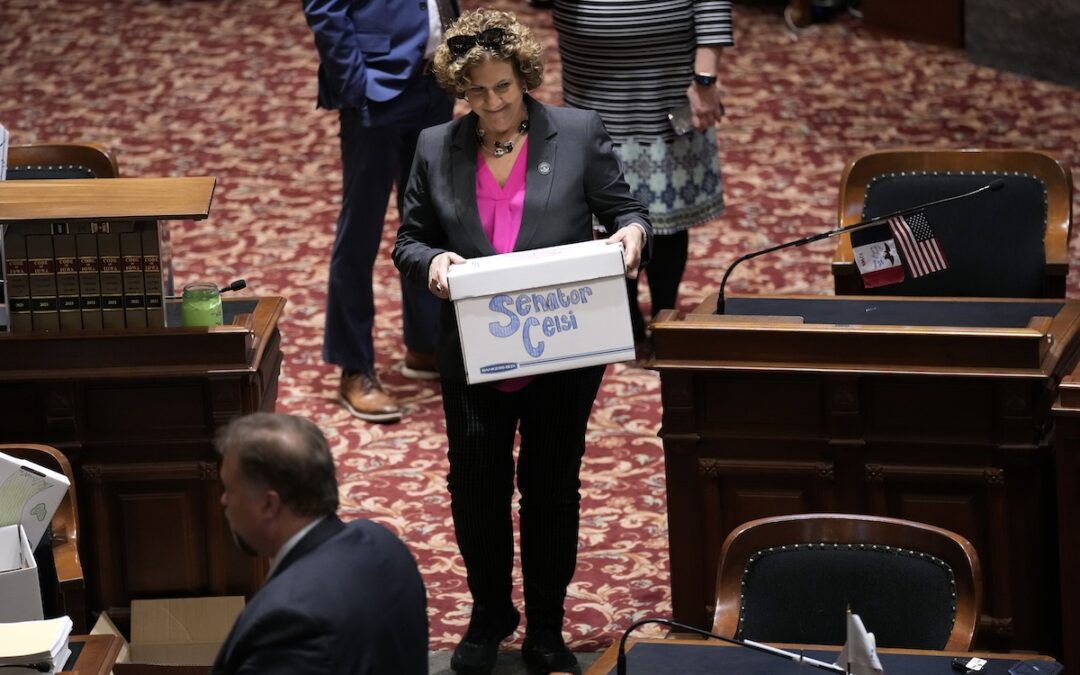
Shutterstock
Iowans have long struggled to find reliable, affordable child care, often waiting months or more on lists to get their children into a center. The basic problem is that not enough Iowans want to work in child care due to low wages, and so the state has long dealt with access issues.
After little progress, Republican lawmakers, who have held large majorities in their governing trifecta for nearly a decade, made several changes in laws passed in recent years.
Their solution? Younger, teenage workers and larger class sizes.
Iowa Republicans in 2022 passed a law increasing the child-to-staff ratio by letting workers watch more children at once, effectively allowing less individual care for someone’s child. It lets one person at a child care center take care of up to seven 2-year-olds and 10 3-year-olds. It also allows teenagers 16-and-older to watch children without supervision.
Anne Discher, executive director of Common Good Iowa, which advocates for issues impacting families and children, said the organization has always opposed these policies.
“Child care is a challenging and fast-paced job, and loosening ratios and employment rules raises significant health and safety concerns,” she said.
Republicans have defended their policies by saying child care centers don’t have to use the new ratios or teenaged workers, but specialists point out the whole problem is not having enough people to take care of children, so they don’t have much of a choice.
The measures aren’t enough to meet the actual size of Iowa’s problem with child care, either.
According to Discher, adding a few more children to a classroom and relying on teenagers who aren’t full-time employees doesn’t fix the fact that workers don’t want to take child care jobs.
“Absolutely the biggest challenge in child care right now is attracting and retaining workers,” she said.
In 2023, childcare workers were paid an average of $12.62 an hour—$26,250 a year—according to Bureau of Labor Statistics data.
Because the pay is so low, people don’t have a reason to go into the profession, and the lack of workers is the main reason child care is so hard to find in the state.
“Passing rules like these allows lawmakers to say they’ve taken action without doing the things that would really make a difference for Iowa families,” Discher said.
There have been some other measures focused on families looking for child care, but there have been mixed results.
In August this year, Republican Gov. Kim Reynolds announced a new website parents can use to find child care options near them.
In 2023, Republicans passed a bill raising the eligibility limit for the state assistance program. However, it added more work requirements, so families who need the assistance have to prove they’re working, in school, or in training for 32 hours a week in order to qualify.
Reynolds has also used state and federal funds to create grant programs for providers, but she purposely didn’t apply for a $30 million federal grant for childcare assistance that could have gone toward early childhood services including quality improvement, needs assessments, workforce compensation, recruitment, and retention; and support and direct services for young children.
Discher said she’s encouraged by how many candidates are talking about child care and the fact that elected leaders are paying attention at all, but there’s still work to do.
“I’m not really seeing any groundbreaking policies that will make a fundamental difference get traction, mostly small gains around the edges,” Discher said.
The biggest solution, Discher and other advocates have long said, is to pay child care workers a competitive, professional wage.
“To fill child care slots, centers need workers to care for children—if they can’t hire workers, they can’t offer care,” Discher said.
Support Our Cause
Thank you for taking the time to read our work. Before you go, we hope you'll consider supporting our values-driven journalism, which has always strived to make clear what's really at stake for Iowans and our future.
Since day one, our goal here at Iowa Starting Line has always been to empower people across the state with fact-based news and information. We believe that when people are armed with knowledge about what's happening in their local, state, and federal governments—including who is working on their behalf and who is actively trying to block efforts aimed at improving the daily lives of Iowan families—they will be inspired to become civically engaged.


Renee Hardman chosen as Iowa Democrats’ nominee to replace Claire Celsi
Iowa Democrats have chosen West Des Moines City Council Member Renee Hardman as the party's nominee for a coming special election for an Iowa...

Sen. Claire Celsi remembered for her passion and outspokenness
The Democratic state senator from West Des Moines died on Oct. 6 after a bout with an undisclosed illness. West Des Moines resident Al Womble will...

Iowa pumps brakes on crypto ATM transaction fees
A new law caps daily crypto ATM transactions at $1,000, limits fees to 15% of the transaction amount, and requires operators to provide full refunds...

Iowa Legislature passes budget bill, adjourns with no property tax cut
Lawmakers worked through the night Wednesday to reach a budget deal after a contentious session went into overtime. While most of us were sleeping,...

Opinion: Zach Nunn is my congressman. I had to travel to DC just to talk to him.
I recently traveled to Washington, D.C. with a group of Iowans to talk with my representative: Congressman Zach Nunn. We weren’t sightseeing. We...

Op-ed: Iowa School Chaplain Bill is a Christian Nationalist Knock Off
The School Chaplain bill is currently rushing through the Iowa legislature – it’s now heading to the Iowa Senate floor as H.F. 884, having passed...





